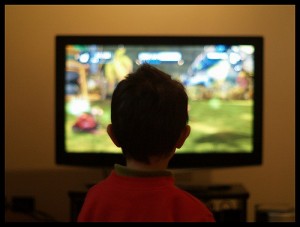
We often see stories in the news claiming that video games have a negative effect on childhood health and behaviour. However, in reality, there is little agreement in the scientific literature about the exact nature of how video game play might have an impact on us, be it positive or negative (Elson M and Ferguson CJ, 2014).
There are a number of reasons why this is the case, but part of the problem is that there are relatively few large scale observational studies that look at video game effects in a meaningful way, and of those studies that do exist, there is very little data from European populations that looks at the potential associations between video game use and mental health outcomes.
Kovess-Masfety (2016) and colleagues have tried to address this issue with a large-scale cross-sectional study, recently published in Social Psychiatry and Psychiatric Epidemiology. The aims of the study were threefold:
- To determine how much time primary school children across Europe spend on playing video games
- To determine whether there was an association between video game use and academic performance
- To determine whether there were any associations between playing video games and mental health issues

There is significant disagreement about the impact that video games have on children and young people.
Methods
Data were taken from the School Children Mental Health Europe (SCHME) study, a cross-sectional survey conducted across a number of European countries in 2010. The final sample used in the current study consisted of 3,195 schoolchildren aged 6-11 from the Netherlands, Germany, Lithuania, Bulgaria, Romania and Turkey.
From the data set, four measures of interest were derived:
- Video game use was measured via parental report. Mothers were asked how long, on average, their child spends playing video games each week.
- Low video game use was categorised as playing between 0 and 60 minutes per week
- Moderate use categorised as between 61 and 300 minutes per week
- High use as over 300 minutes (5 hours) per week.
- Mother/Teacher-reported mental health status was measured using the parent and teacher versions of the Strengths and Difficulties Questionnaire (SDQ; Goodman R, 1997). The SDQ is a behavioural questionnaire that assesses childhood psychological wellbeing and can be divided into subscales measuring likelihood of emotional problems, hyperactivity, conduct problems, peer relationship difficulties and prosocial behaviour.
- Child self-reported mental health status was measured using the Dominic Interactive computerised assessment tool (Valla JP, Bergeron L and Smolla N, 2000). This is a self-administered test that presents children with cartoons of another child, Dominic (or Dominique), experiencing a thought or feeling (e.g. “Do you often feel worthless or guilty?”). The child is then asked if they experience the same feeling.
- Academic performance was measured via teacher reports of individual child performance and observed learning behaviour.
Alongside these, a range of potential confounding variables were assessed via mother self-report. These included factors such as socioeconomic status, parental education and parental psychological distress.
Regression analyses were used to try and determine whether there were any associations between mental health outcomes and video game use, taking into consideration the potential confounding factors mentioned above.
Results
- High video game use was associated with higher intellectual functioning and academic achievement, and lower prevalence of mental health difficulties
- High video game use was not associated with conduct disorder, depression or anxiety
- High video game use was also associated with lower parent/teacher evaluations of peer relationship problems
- Reported use of video games:
- 20% of the children were reported as spending 5 or more hours per week
- 40% spent between 1 and 5 hours per week
- 39% spent less than 1 hour per week playing video games
- Factors associated with increased video game play included being male, older, and having a medium-sized family.

1 in 5 young people in the study sample, played video games for 5 or more hours per week.
Conclusions
The authors concluded that:
Video game use is not associated with an increased risk of mental health problems. On the contrary, the data presented here suggest that video games are a protective factor, especially regarding peer relationship problems for the children who are the most involved in video games.
They argue that video game play is beneficial, both for cognitive functioning as well as for general mental health. However, they suggest that more long-term, longitudinal work would be needed to determine whether any positive effects are persistent.

This study argues that video games may be beneficial for mental health, but we should be cautious about interpreting these findings.
Limitations
While the findings of the study are interesting, caution must be urged in concluding that video games have a protective function. One major limitation of this study lies in the way that the researchers measured video game use; they used a fairly crude measure of amount of time per week, as reported by mothers. Aside from the fact that measuring game use in this way may be subject to systematically over- or under-estimation of time spent, it’s not actually all that useful a measure. This is because it doesn’t take into account two of the most important factors in video game play; the content of the games being played, and the context in which children are playing them. In other words, it’s not clear whether playing 5+ hours of 18-rated video games with mature themes produces the same effect as playing 5+ hours of a mobile phone puzzle game, or sports game, or any other game. Similarly, playing video games in isolation may have a different effect than playing them with friends or family. As with a lot of research in this area, this study can’t unpack these issues.
Moreover, the study used a cross-sectional design, which means that it isn’t possible to establish a long-term cause-and-effect relationship between high video game use and positive or negative outcomes. For instance, the authors state that:
Children whose mother and teacher both reported as having problems with peer relationships or with an elevated total difficulties score were less likely to be in the high usage group.
It’s entirely possible that the children who were experiencing peer relationship problems had been previously identified as playing video games too often, and as a result game use had been restricted before the start of this study. As a result, the extent to which the results from the study can have broader implications are very limited.

This study does not consider the content of the video games played by young people or the context in which they were played.
Summary
While it’s great to see more research on the effects of video game use that uses large samples of children, unfortunately, this study doesn’t do much to help alleviate the problems that abound in the research literature. What video game effects research desperately needs is more studies that take a more nuanced approach to looking at how (and why) people play video games; crude measures that simply assess the amount of time spent on them don’t really help that much.
Therefore, given the above concerns about the methodology, it might be more useful to see this study as a springboard for further, more detailed research on the topic. If we can figure out what actual aspects of video game play might have contributed to the current study’s results, in time that might lead to more specific, and ultimately more useful research questions that we can ask.

Future research needs to look at which aspects of video games might have positive and negative associations with mental health.
Conflicts of interest
Pete has recently published a longitudinal study looking at the associations between video game use, conduct disorder and depression. He does not know the authors of the current study, and was not involved in it at any stage.
Links
Primary paper
Kovess-Masfety V, Keyes K, Hamilton A. et al (2016) Is time spent playing video games associated with mental health, cognitive and social skills in young children? Social Psychiatry and Psychiatric Epidemiology 2016 51 349–357 [PubMed abstract]
Other references
Elson M, Ferguson CJ. (2014) Twenty-five years of research on violence in digital games and aggression: Empirical evidence, perspectives, and a debate gone astray (PDF). European Psychologist 2014 19 33-46.
Goodman R. (1997) The Strengths and Difficulties Questionnaire: a research note. Journal of Child Psychology and Psychiatry 1997 38(5) 581–586. [PubMed abstract]
Valla JP, Bergeron L, Smolla N. (2000) The Dominic-R: a pictorial interview for 6- to 11-year-old children. Journal of the American Academy of Child and Adolescent Psychiatry 2000 39(1) 85–93. [PubMed abstract]

@Mental_Elf Please let it be that it makes one more sharper and astute!
@Mental_Elf Yes!!
They’re poisonous. We strictly limit but I’d prefer they didn’t exist.
Did you read the blog Alex? You may be worrying unnecessarily. High video game use was associated with higher academic achievement and fewer mental health problems. Of course, association is not the same as causation, but I think there are grounds here to consider the possibility that they are not in fact detrimental per se.
“Associations between video game, academic performance and mental health issues in European primary school children” https://t.co/r2AnZgN6DG
Today @PeteEtchells Is time playing video games assoc w mental health, cognitive & social skills in young children? https://t.co/9YjRtRdG8S
Are video games damaging or protecting the mental health of our young people? Discuss! @PeteEtchells https://t.co/9YjRtRdG8S
@Mental_Elf gaming as a potential treatment ? great piece @PeteEtchells
@Mental_Elf @PeteEtchells Damaging or protecting.. Hmm, false dichotomy much? ;-)
@Mental_Elf @PeteEtchells what would you expext? Positive: hand eye cord. Imagination. Colour (cont) https://t.co/IhXau2VaeL
@Mental_Elf @PeteEtchells presumably you would need some well designed trials, or at least propensity matching or IV approaches to say.
@BlotchedEmerald @Mental_Elf yeah, there’s tons of work that needs doing in this area.
Relief to me as I m bringing my 2young gamers to a gaming conference in a few wks#MomOfYear @Mental_Elf @PeteEtchells
@Mental_Elf @PeteEtchells Protecting, as our RCT shows: Childhood anxiety prevention with MindLight https://t.co/4fI5CPF1Sg
@E_Schoneveld @Mental_Elf ah, great! Thanks, will have a read – looks really interesting.
@Mental_Elf @PeteEtchells @BlotchedEmerald indeed, tons of well designed studies needed. Working on that with @PlayNiceInst @Radboud_Uni
@Mental_Elf @PeteEtchells And collaborating with talented game designers is important to have an impact @GainPlay_Studio
@E_Schoneveld @Mental_Elf @PeteEtchells we could not agree more! Games are a powerful tool if designed and used properly
@Mental_Elf @PeteEtchells And games are perfect tools to measure emotions and behavior, giving insight into intervention working mechanisms
@Mental_Elf @PeteEtchells
I’m so jealous I didn’t get this article!
@PeteEtchells raised issue: paper didnt distinguish btwn mobile gaming/18+ games
I think it wud b hard2play >5hrs/week on mobile
@Mental_Elf
I can really recommend something that requires absolute concentration (e.g. super hexagon) for clearing your head.
Video games, academic performance and mental health https://t.co/C04uMyA9Z9
RT @Mental_Elf: New study argues that video games may be beneficial for mental health, but we shld be cautious abt interpretation https://t…
Associations between #videogame use, academic performance & #mentalhealth issues in European primary school children https://t.co/TFdfwRQMLR
Research must consider content of video games played by young ppl & context in which they’re played https://t.co/9YjRtRvhxs
Hi Pete, excellent first article! Thanks for this. I was curious, though: when looking at the different age bands, were the same associations present and just increasing in strength with age, or were there different patterns by age?
#Video games, #academic performance and child #mentalhealth. #adhd #anxiety https://t.co/ntJkDz7LY6
Video games and academic performance…..where is the problem? https://t.co/vzIPQdqpOw .@PeteEtchells
What impact are #VideoGames having on the #MentalHealth of children & young people? https://t.co/9YjRtRvhxs
@Mental_Elf A huge, harmful impact!
Obsession driven, ostracising selves from family, irrational aggressive outbursts, withdrawal…
Don’t miss: Associations between video game use, academic performance and mental health https://t.co/9YjRtRvhxs #EBP
After playing video games most of my life this was a refreshing read. I did wonder about the blanket use of the term “video games” which could describe anything from running around mazes in pacman to graphic interactive torture scenes in Grand Theft Auto 5. Could we draw blanket conclusions if the same study had focused on “watching DVDs” when some kids were watching The Lion King while others were watching Cannibal Holocost?
Great piece
@keirwales
Associations between video game use, academic performance and mental health issues https://t.co/ameVxxGCK5 käyttäjältä @sharethis
RT @Mental_Elf: Future research needs to look at which aspects of video games might have positive & negative assocs w mental health https:/…
Video games, academic performance and mental health https://t.co/rI0bzzfZPS
Associations between video game use, academic performance and mental health issues in European primary school: https://t.co/VqaBo47erV
[…] Associations between video game use, academic performance and mental health issues in European prima… […]
[…] 1The Mental Health Elf: Video games, academic performance and mental health […]